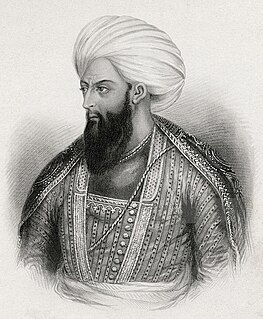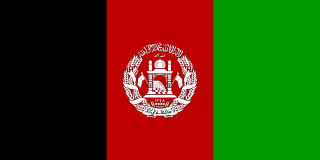
The European influence in Afghanistan refers to political, social, and mostly imperialistic influence several European nations and colonial powers have had on the historical development of Afghanistan.

A loya jirga is a special type of jirga, or legal assembly, in Pashtunwali, the traditional code of laws of the Pashtun people. It is mainly organized for choosing a new head of state in case of sudden death, adopting a new constitution, or to settle national or regional issue such as war. It predates modern-day written or fixed laws and is mostly favored by the Pashtun people but to a lesser extent by other nearby groups that have been influenced by Pashtuns.
The politics of Afghanistan consists of the cabinet of ministers, provincial governors and the national assembly, with a president serving as the head of state and commander-in-chief of the Afghan Armed Forces. The nation is currently led by President Ashraf Ghani who is backed by two vice presidents, Amrullah Saleh and Sarwar Danish. In the last decade the politics of Afghanistan have been influenced by NATO countries, particularly the United States, in an effort to stabilise and democratise the country. In 2004, the nation's new constitution was adopted and an executive president was elected. The following year a general election to choose parliamentarians took place.
The Afghan Constitution Commission was established October 5, 2002 as required by the Bonn Agreement, which stipulated that a new Afghan constitution be adopted by a loya jirga. The loya jirga was required to convene within eighteen months of the establishment of Afghan Transitional Administration, which was established by the Emergency Loya Jirga in June 2002. After some delay, the proposed Afghan Constitution was presented to President Hamid Karzai on November 3, 2003. A loya jirga began December 14, 2003 in Kabul and was endorsed January 4, 2004.

Dost Mohammad Khan was the founder of the Barakzai dynasty and one of the prominent rulers of Afghanistan during the First Anglo-Afghan War. With the decline of the Durrani dynasty, he became Emir of Afghanistan from 1823 to 1839 and then from 1843 to 1863. An ethnic Pashtun, he was the 11th son of Sardar Payendah Khan who was killed in 1799 by Zaman Shah Durrani. At the start of his rule in March 1823, the Afghans lost their former stronghold of Peshawar Valley to the Sikh Khalsa Army of Ranjit Singh at the Battle of Nowshera. The Afghan forces in the battle were supported by Azim Khan, half-brother of Dost Mohammad Khan.
This index list around 14% of all Afghanistan-related articles on Wikipedia.

Paghman is a town in the hills near Afghanistan's capital of Kabul. It is the seat of the Paghman District which has a population of about 120,000, mainly Pashtuns and Tajiks. The gardens of Paghman is a major attraction, and is why the city is sometimes known as the garden capital of Afghanistan.
Prince Agha Abdul Karim Khan Ahmedzai was the younger brother of Khan of Kalat, Mir Ahmedyar Khan, the last ruler of Balochistan. After the British left Balochistan on 13 August 1947.

This article gives information on elections in Afghanistan.

The Transitional Islamic State of Afghanistan (TISA), also known as the Afghan Transitional Authority, was the name of a temporary administration of Afghanistan put in place by the loya jirga of June 2002. It succeeded the original Islamic State of Afghanistan and preceded the current Islamic Republic of Afghanistan.

Sardar Ghulam Muhammad Khan Tarzi son of Sardar Rahim Dil Khan was a ruler of Kandahar and Baluchistan. He was a Pashtun soldier, poet, and military leader in Afghanistan. He is often credited with developing the traditional family name 'Tarzi,' which played a critical role in the history of Afghanistan.
The following lists events that happened during 2004 in Afghanistan.
The following lists events that happened during 1964 in Afghanistan.

The two branches of the Barakzai dynasty ruled modern day Afghanistan from 1823 to 1973 when the monarchy ended under Musahiban Mohammed Zahir Shah. The Barakzai dynasty was established by Dost Mohammad Khan after the Durrani dynasty of Ahmad Shah Durrani was removed from power.

National Reconciliation is the term used for establishment of so-called 'national unity' in countries beset with political problems. In Afghanistan the People's Democratic Party of Afghanistan government under Babrak Karmal issued a ten-point reconciliation program in 1985 upon the advice of Soviet leadership. Karmal appointed a six member group who belonged to no political party to his government to pursue the task. Mohammad Najibullah later intensified and broadened the proposals in 1987 and ended early in the 1990s to stop the Afghan civil war which had haunted the country since 1978 after the Saur Revolution. At the National Reconciliation meeting they came to the conclusion that the Soviet armed forces in Afghanistan should withdraw.
The Afghan President Hamid Karzai announced the holding of a consultative grand council called the Afghanistan's National Consultative Peace Jirga (NCPJ) or shortly Peace Jirga in his inauguration speech on 19 November 2009, after winning elections for a second term, to end the ongoing Taliban insurgency. At the International Afghanistan Conference in London on 28 January 2010, he announced that the government would hold the event in April or May 2010, intended to bring together tribal elders, officials and local power brokers from around the country, to discuss peace and the end of the insurgency. "Jirga" is a word in the Pashto language that means "large assembly" or "council". It is a traditional method in parts of Afghanistan and Pakistan of resolving disputes between tribes or discussing problems affecting whole communities.
The Babar or Babori tribe is a Pashtun tribe. The Babar diasporas is spread across Pakistan, and Afghanistan.
2003 in Afghanistan. A list of notable incidents in Afghanistan during 2003
Bārakzai is the name of a Pashtun tribe from present-day, Kandahar, Afghanistan. '"Barakzai" is a common name among the Pashtuns and it means "son of Barak" in Pashto. There are seven distinct Pashtun tribes named Barakzai, with the Zirak branch of the Durrani tribe being the most important and largest tribe with over 4 million people.
Humayun Azizi is an Afghani physician who served as a governor of Kandahar Province, Afghanistan, from April 2015 until 2017. He has previously been state minister for parliamentary affairs. Currently He is the Ambassador of the Islamic republic of Afghanistan to the kingdom of the Netherlands since August 2017







